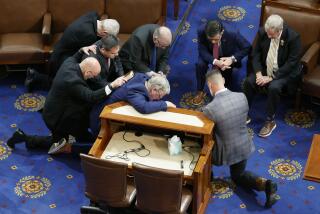Freedom From Religion -- That Too Is a Right
- Share via
It just hit me one day. I was looking at the money in my hands, and I noticed, as if for the first time, the words “In God we trust” on every coin and every bill of every denomination. “What’s this?” I wondered.
I don’t trust in God. I’m an atheist. Don’t I count as an American? Isn’t ours the country that holds itself out to the world as the beacon of religious liberty? Isn’t there something in the Constitution that says that the government can’t take sides in a religious debate?
To find the answer, I read the Constitution. There they were, the first 10 words of the Bill of Rights: “Congress shall make no law respecting an establishment of religion.” Saying on our coins and currency that Americans trust in God surely didn’t seem to be in keeping with the spirit of that establishment clause.
I started doing research and learned that in the middle of the McCarthy era in the 1950s -- not a particularly splendid moment in our history -- Congress went religiously berserk in its battle against “godless” communism. In 1954, 62 years after the Pledge of Allegiance was written, the words “under God” were added. In 1955, “In God we trust” was mandated to be placed on all our coins. In 1956, “In God we trust” was made our national motto.
The United States had done quite well for almost two centuries without that barrage of theistic dogma, yet our legislators felt it reasonable to violate both the spirit and the letter of the establishment clause in order to pander to a religious majority at the height of the Cold War. So in 2000, I decided to make the intrusion of “under God” into the Pledge of Allegiance the target of a legal challenge.
Since then, I have learned some of the history that I regretfully never picked up in school. We had some amazing men -- the framers -- who literally invented our extraordinary form of government. Fifty-five visionaries set themselves in a building for two months in 1787, and they developed a completely novel set of principles dedicated to forming a truly free society.
They argued, discussed, researched, debated -- maybe even prayed -- until they came up with one of the most glorious documents of all time: our Constitution.
Unlike the constitutions of the colonies, our federal Constitution has no mention of God. Despite the fact that every colonial preamble referred to “the Almighty,” “the Supreme Ruler of the Universe” or some similar divinity, the preamble to the U.S. Constitution contains no such reference. Furthermore, we have a clause that specifically prohibits any religious test as a qualification for public office -- a concept that broke strongly with the traditions of the times.
The Bill of Rights was added to the Constitution because people feared that without its specific guarantees, the federal government might trample on their cherished freedoms. The words of the establishment clause were revised over and over until it was formulated in the broadest and most explicit language imaginable: “Congress shall make no law respecting an establishment of religion.”
I read the Supreme Court cases and learned that, despite its frequent use of inspiring rhetoric, the high court has nonetheless ruled that giving tax exemptions to religious organizations doesn’t provide them with financial benefits, that it’s OK for Congress to begin every session with a chaplain-led prayer and that displays of the birth of Jesus are not religious.
I have also learned how deep is the antipathy toward atheists. According to a 1999 Gallup poll, half the population would refuse to vote for atheists like me.
I learned that politicians are as spineless as we’ve all been led to believe. Despite the Supreme Court rulings to the contrary, Arkansas, Maryland, Mississippi, North Carolina, Pennsylvania, South Carolina, Tennessee and Texas still have clauses in their constitutions that deny atheists the right to hold public office.
Similarly, not a single senator -- and fewer than 1% of the House members -- has been willing to stand up and acknowledge that there is at least a valid constitutional concern underlying the 9th Circuit Court of Appeals’ decision in my case. The court ruled that having public schools lead children in reciting the words “under God” in the Pledge of Allegiance is unconstitutional.
Finally, I’ve learned that our system of government is remarkable and unique. Although I recently passed the bar, I started with essentially no knowledge of the mechanics of filing a lawsuit. Yet, despite doing my own research, writing my own briefs and appearing in court with no legal counsel, I was treated with the utmost respect by federal judges.
More than anything, I’ve learned to truly appreciate the genius of the constitutional democracy left to us by the founders. It’s still amazing to me that one individual can force the entire nation to at least ponder the ideals upon which our laws rest.
I feel that only one more lesson lies ahead: the one showing that our citizens understand that the security of liberty rests on the adherence to those ideals, even when we don’t personally like the results.
*
Michael Newdow is a Sacramento doctor.
More to Read
Sign up for Essential California
The most important California stories and recommendations in your inbox every morning.
You may occasionally receive promotional content from the Los Angeles Times.










